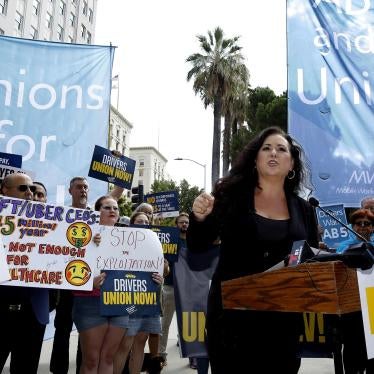Human Rights Watch and Amnesty International are deeply concerned that the passage of Proposition 22, a ballot initiative in California, will undermine the rights of workers for app-based companies in the state and set a dangerous precedent across the United States and globally.
Prop 22 permits companies to continue treating “app-based rideshare and delivery drivers” as independent contractors rather than employees, effectively stripping them of a range of employee protections and benefits that Assembly Bill 5, a state law passed in 2019, provided to them. It also creates significant new obstacles to protecting the right of app-based workers to organize in the future.
This evisceration of wage and labor protections in the gig economy is a grave threat to workers’ rights to earn a decent living, and safe and healthy working conditions. In practice, it could be discriminatory, by disproportionately harming the rights of workers of color. A 2020 survey of app-based drivers and delivery workers in San Francisco conducted by the University of California Santa Cruz shows that 78 percent identify as people of color.
One poll indicates that about 40 percent of mail voters that voted for Prop 22 believed they were supporting workers in getting a “livable wage.” In reality, Prop 22 denies app-based workers in California the local minimum wage for all the hours they work, putting many at greater risk of hunger, poverty, and ultimately destitution.
Prop 22 requires companies to pay workers 120 percent of the applicable minimum wage while they are fulfilling ride or delivery requests, but this formula fails to compensate workers for their time waiting for requests. The reimbursement rate for miles driven to complete and deliver orders is also half the rate recommended by the Internal Revenue Service – all other expenses remain the responsibility of workers.
A 2019 study by the University of California Berkeley estimated that, after wait time and expenses, app-based drivers could make as little as $5.64 per hour with Prop 22, far below the federal minimum wage and California’s minimum wage.
Minimum wage protections help ensure that workers have sufficient income to feed themselves and their families, pay rent, cover childcare costs, and afford other essential elements of their right to an adequate standard of living. The absence of wage floors has emboldened some app-based companies to enact steep pay cuts that leave workers struggling to make ends meet.
As these companies increasingly rely on opaque algorithms to calibrate how much they pay workers, this is also creating unpredictable reductions and fluctuations in their earnings that exacerbate financial precarity.
Prop 22 also spells danger for the health and safety of app-based workers. Prop 22 strips workers of essential labor protections, such as guaranteed sick pay and compensation for work-related injury or illness. Without these protections, workers face no-win choices between going to work sick or injured or losing income. These choices could not be starker in the middle of a pandemic and the largest economic crisis since the Great Depression.
Any amendment to Prop 22 must be carried by a seven-eighths majority vote in the state legislature or through another ballot initiative, which makes it very difficult to change in the future. We find it alarming that Prop 22 also denies app-based workers the ability to collectively bargain for better working conditions and become members of unions to represent their interests without such a vote or initiative. This is a serious affront to their freedom of association and the right to organize.
The corporate-sponsored Prop 22 – which a handful of app-based companies spent over $200 million to support, making it the most expensive ballot initiative campaign in California’s history– should not be the final say on the protection of these workers’ rights, particularly given robust and ongoing public discourse about how workers’ rights should be protected in the gig economy.
The corporate-backed campaign demonstrates the ability of app-based companies to use their financial power and leverage to influence and shape regulations that they perceive as a threat to their business, with profound consequences for human rights.
No worker should face exploitative or otherwise abusive work conditions, but many app-based workers do. We urge app-based companies to bring their wage and labor policies and practices in line with international human and labor rights standards. We urge the government of California to explore other legal avenues for holding companies accountable for respecting workers’ rights. Finally, we urge the United States Congress and the United States Department of Labor to protect the rights of app-based workers, such as through legislative and regulatory action that helps ensure a living wage, paid sick and family leave, and workers’ compensation for illness and injury.
Background
Prop 22 is a ballot initiative that was passed by a majority of voters in California during the US election held on November 3, 2020. Prop 22 permits “rideshare and delivery network companies” to continue treating app-based rideshare and delivery drivers” as independent contractors rather than employees, and establishes its own set of wage and labor rules for these workers. In California, employees are entitled to the applicable state or local minimum wage for all hours that they work, and other protections such as paid sick leave, workers’ compensation for getting sick or injured on the job, and unemployment insurance. Companies are also required to pay contributions to Social Security or Medicare for employees.
The ballot initiative process provides voters a path to adopt laws or amendments to the state constitution without the support of the executive branch or the legislature. The ballot initiative that was eventually named Prop 22 was filed on October 29, 2019. On May 22, 2020, California’s Secretary of State confirmed that Prop 22 had received the required number of signatures from registered voters to qualify for the 2020 general election ballot.






